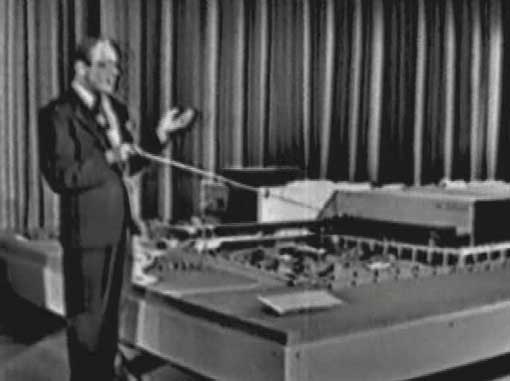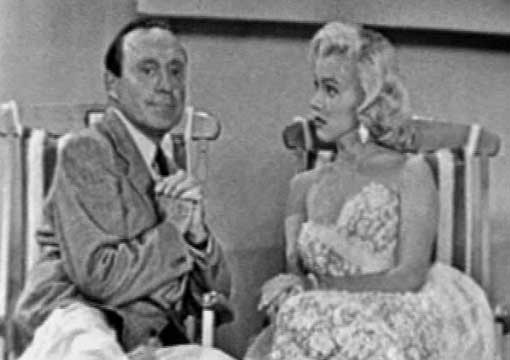
The best thing about watching 1950s TV episodes is when they're still hysterically funny. The second best thing is seeing superstars before they were super, still working their way up to icon status.
And the three DVD releases in our New This Week spotlight all qualify on one count or the other, as they salute Jack Benny, Betty White and Johnny Carson.
Plus Milton Berle, Sid Caesar, Gracie Allen, Gertrude Berg, Martin & Lewis, Amos 'n' Andy, and other mainstays of early TV.
They're also bargain buys, costing just $10 each for 4 discs apiece.
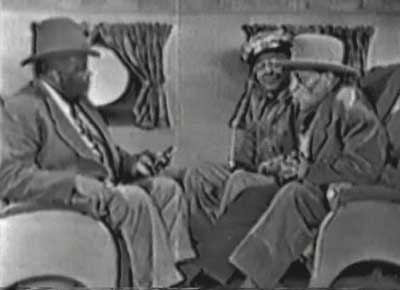
What they aren't is the clearest source material, or well documented as to when/where the shows appeared, or stocked with bonus features, or much of anything else that usually inspires us to recommend TV DVD purchases. These 3 sets aren't, in fact, even new, despite being "released" this week by the distributor Mill Creek. They're actually repackagings of content that's long been available in different (if not essentially exactly the same) form.
But their virtues outweigh their weaknesses for TV history nuts like me, to whom they're all fresh and treasured additions to the DVD library.
The Best of Jack Benny is the biggest thrill, since this comedian's pennypinching routine and double take reactions never get old. Benny had a half-century in vaudeville, radio and TV to hone them, and he did, to a fare-thee-well. His timing in his 1950-65 CBS comedy half-hour is impeccable. And the episodes' scripts -- well, they're frequently semi-insane.
Garry Shandling and Seinfeld both owe Benny an enormous debt for both his winking behind-the-scenes portrayal of TV production and his giddily surreal plots about sex dreams, movie stars, and anything-and-everything in daily life, up to and including suicide. (That would be the Christmas show with Mel Blanc's salesclerk tortured by tightwad Benny to the final gunshot.) These shows are seriously out there.
Click here for an episode-by-episode rundown from a savvy Amazon user, listing the jam-packed guest list (from a near-duplicate 2007 release) -- Marilyn Monroe, Humphrey Bogart (goofily delivering the product-placement spiel for sponsor Lucky Strike cigarettes), Bing Crosby, Bob Hope, George Burns, Kirk Douglas, James Stewart, Ernie Kovacs, Zsa Zsa Gabor, et al. In addition to his Jack Benny Program episodes, the set includes Benny TV specials (a 1965 hour features The Beach Boys) and his appearances on General Electric Theater.
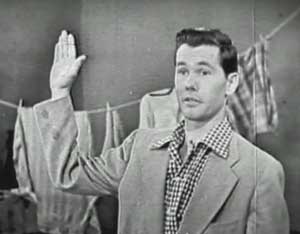
Even stranger a compilation is Johnny Carson: Late Night Legend, whose 4 discs include absolutely nothing of Carson in late night. A 2008 version of this set was more accurately titled "Johnny Carson & Friends." Fully half of this set doesn't even include the Tonight icon.
But Carson's pre-Tonight shows here are indeed illuminating, as he develops his chat skills in live-aired daytime talkfests and quiz shows. One latter episode of Who Do You Trust? becomes an absolute scream when a contestant gets locked in the "isolation booth," forcing stagehands to haul a ladder onto the set to free him, while Carson tries to keep composed amid the chaos. Also fun is his earliest outing, Carson's Cellar, a local Los Angeles sketch show in which he's already wearing dresses for comedic effect. (Early Aunt Blabby?)
The set's non-Carson content is amazing in itself, showcasing some of TV's late '40s-early '50s vaudeville-based comedy, from Martin & Lewis on Colgate Comedy Hour to Sid's Caesar's Hour. And then there's Milton Berle's Texaco Star Theater (7 episodes in the set) -- this was the medium's first true sensation, setting ratings records and selling millions of pricy early TV sets.
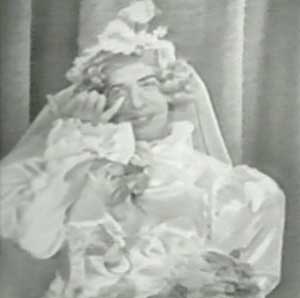
It's easy to see why. This show is completely bonkers. Vaudeville and burlesque veteran Berle dresses in drag for the hell of it, blurts motormouth nonsense at his guests, and picks apart the show with his producers and staffers as it progresses. He's a completely loose cannon -- on live TV, of course, since videotape hadn't been invented -- and viewers were compelled to tune in just to see what sort of lunacy he'd unleash next.
But the Carson set's real sleeper is a 1952 all-star special peculiarly titled Stars in the Eye (CBS being the "eye"-logo network). Made to salute the opening of CBS' new Los Angeles studio complex named Television City -- Craig Ferguson and The Price Is Right still tape there today -- this live telecast is crammed with all of the network's stars of the time, gathered in the new studio in the same hour: Jack Benny, Eve Arden, Desi Arnaz, George Burns, Gracie Allen, Art Linkletter, Marie Wilson and Alan Young, and a dozen more, plus the California governor, Earl Warren, trading jokes with Gracie on his way to the Supreme Court (and 1954's historic Brown vs. Board of Education decision).
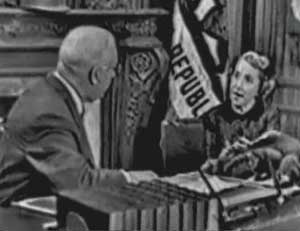
CBS' top draw at the time, Lucille Ball was about to deliver Desi Jr. and so appears only via film, in a series of outtakes where Benny surprises her at I Love Lucy shoots by playing nightclub waiters and other bit parts. Topping it off while starting it off, Stars in the Eye opens with an airborne sketch featuring TV's Amos 'n' Andy stars Spencer Williams, Alvin Childress and Tim "Kingfish" Moore.
Whoa. Impressive. So's the entire polyglot set. (Entire contents listed here in another helpful Amazon review.)
Betty White couldn't be expected to keep up with all that, considering that the 4 discs of her Mill Creek set contain only episodes from two of her 1950s sitcoms -- her breakthrough gig in 1953's Life With Elizabeth and 1957's Date With the Angels. She's already star material, obviously, as the title character in the former. But Elizabeth (shot for syndication) is so low-budget and so simply written, it's now almost impossible to watch. Each half-hour presents three unrelated "incidents" in the life of her young housewife. Angels is at least professionally produced -- and its supporting cast features welcome sitcom standbys Richard Deacon and Burt Mustin -- but its young-couple comedy isn't much to write about, either.
Still, it's the earliest work of America's current, and former, and forever, it seems, sweetheart -- already charming, impish, sharp and commanding.
Too bad Betty White wasn't on CBS back then, or she'd have been a star in the eye, too.
